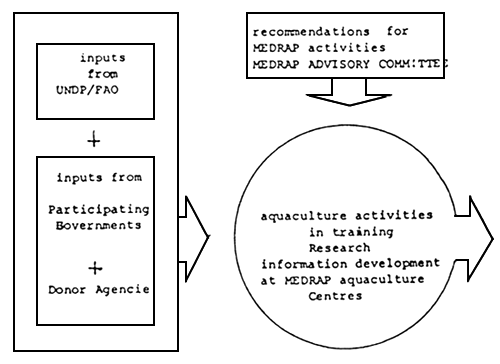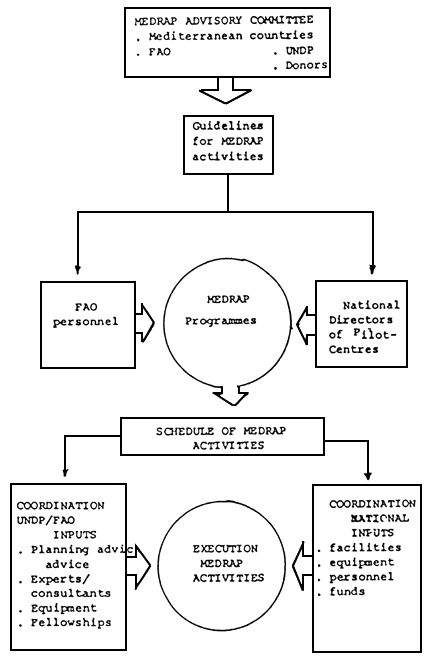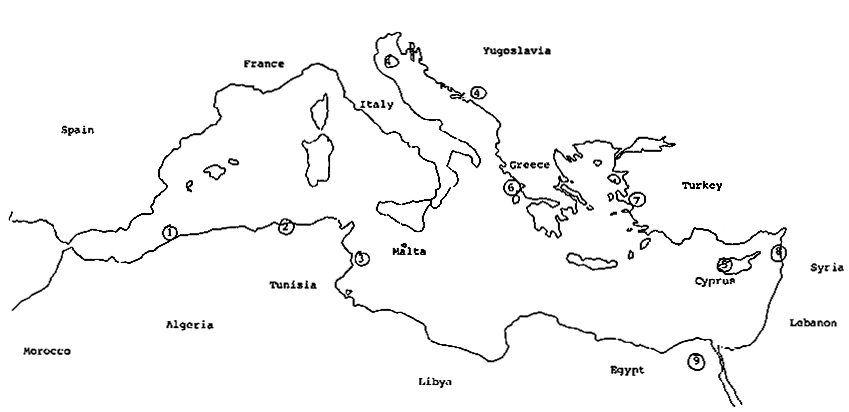| Summary | ||
| Network of aquaculture centres in the Mediterranean | ||
| Development of aquaculture technologies, information and personnel for the Mediterranean region | ||
| Regional Project (RAB/79/033 and RER/78/004) between UNDP/FAO and participating Governments | ||
| Training of core personnel needed for planning and implementation of national aquaculture development programmes | ||
| Regional Aquaculture Pilot Centres that: | ||
| - | participate in the activities and host training sessions | |
| - | test the improved or new technologies under local conditions | |
| - | identify local problems in aquaculture and refer to MEDRAP for solution | |
| - | participate in two-way exchange of expertise and personnel | |
| Coordinate and support multidisciplinary field research on selected fish culture systems for adaptation or improvement of technologies and for the development of new technologies | ||
| Develop an information bank on aquaculture for regional use | ||
| Supported by participating Governments, UNDP/FAO and various donor agencies. | ||
1. MEDITERRANEAN REGIONAL AQUACULTURE PROJECT
The Mediterranean Regional Aquaculture Project (MEDRAP) is a coordinated and interlinked system of Mediterranean fish culture institutions working in close cooperation on the development of technologies, personnel and information required to achieve the long-term objective of increasing fish production through aquaculture in the Mediterranean Region. Regional Aquaculture Pilot Centres are structured in the network to undertake activities in training research and information development.
MEDRAP, set up as a Regional Project, and in agreement between UNDP/FAO and participating governments, operates within the framework of the Technical Cooperation among Developing countries (TCDC).
The project was formulated by the UNDP/FAO Interregional Aquaculture Development and Coordination Programme (ADCP) in response to the recommendations of an Expert consultation on Aquaculture Development in the Mediterranean Region, convened at Athens (1978), and the Intergovernmental Review Meeting on the Protection of the Mediterranean, held at Barcelona (1975), to draw up a coordinated programme of concerted activities, aimed at better utilization of resources of the sea, especially by means of aquaculture development.
Collaboration among countries within a region was perceived by the countries themselves as an effective way of accelerating national aquaculture development. This approach allows optimal use of existing capabilities and facilities white greatly reducing duplication of effort.
MEDRAP started its operations in the latter half of 1981 with initial organization and planning activities followed by the establishment of regional aquaculture pilot centres in Tunisia, Algeria, Yugoslavia and Cyprus.
The regional head office of MEDRAP is located at the Institut National d'Océanographie et des Pêches (INSTOP), Salammbô, Tunisia. Coordination and assistance with the implementation of MEDRAP activities is provided by and through this office.
2. PILOT CENTRES
A regional aquaculture pilot centre or, in short, a pilot-centre, is the focus of MEDRAP activities which relate to specific aquaculture systems of importance to the host country and the region. The functions of a pilot-centre are to:
3. TRANING ACTIVITIES
MEDRAP training activities aim at developing a core of senior aquaculturists and technicians needed for planning and implementing aquaculture development programmes. Eight group training programmes, which are oriented toward practical work, are presently in preparation.
Besides developing the necessary leadership for national aquaculture development, these residential training courses also provide a forum for participants to share experiences and expertise, and to establish personal and institutional contacts essential to regional cooperation in aquaculture development. The training courses are held in participating countries and especially in pilot-project facilities.
4. RESEARCH
MEDRAP research activities focus on:
Research priorities are based on important current needs and on studies which can be undertaken over a short-term to yield immediate practical results. Research technologies are pursued under local conditions.
5. INFORMATION DEVELOPMENT
The information component of MEDRAP covers the collection, storage and dissemination of aquaculture information and data. The types of information gathered may include:
The headquarters will be equipped with mini-computers and staff trained to operate them, and will function as a data bank where the information is processed, stored and released on request.
6. OTHER ACTIVITIES
Apart from undertaking research, training and information activities, MEDRAP, within the Limits of its resources, provides ad hoc assistance to participating countries in identifying development opportunities, conducting feasibility studies and formulating suitable projects. It also provides short-term and ad hoc assistance in the implementation of projects.
MEDRAP welcomes collaboration and cooperation with other organizations sharing common objectives, so that resources available for aquaculture development in the region may be enhanced to the benefit of the Mediterranean people.
7. SUPPORT AND FUNDING
Support for MEDRAP basically rests with participating Governments and UNDP/FAO.
Government inputs comprise the provision of national personnel, facilities, equipment and funds for research, training (including where possible fellowships for national trainees) and information development activities.
UNDP/FAO provisions to MEDRAP include a team of FAO personnel to plan, implement and coordinate MEDRAP activities, short-term consultants and instructors, some specialized equipment and fellowships. Other sources of funding are under consideration for the enhancement of training activities and pilot-project implementation.
INPUTS OF UNDP/FAO, PARTICIPATING GOVERNMENTS + DONOR AGENCIES applied through the MEDRAP MECHANISM

GENERAL SCHEME OF MEDRAP
Coordinated MEDRAP activities undertaken with the inputs of UNDP/FAO and participating Governments, supported where necessary by donor agencies, are intended to develop trained personnel, appropriate aquaculture technologies and information required for structuring fish production programmes. The general plan of MEDRAP is illustrated above.
| OUTPUTS TO MEDTERRANEAN COUNTRIES |  | |
| 1 • | TRAINED PERSONNEL | |
| • | Senior aquaculturists to plan to direct programmes | |
| • | Junior aquaculturists Et Technicians to execute + extend programmes | |
| 2 • | AQUACULTURE TECHNOLOGIES | |
| • | Finish and shrimps | |
| • | Mussels + oysters | |
| 3 • | INFORMATION BANK | |
| • | Production parameters statistics and other numerical data | |
| • | Bibliographic and nonnumerical data | |
| • | Other information needed for development planning, research and training | |
| MECHANISM OF COORDINATION ET IMPLEMENTATION OF MEDRAP ACTIVITIES | ||
Since regional cooperation is vital co the fulfillment of MEDRAP objectives and functions, the established MEDRAP ADVISORY COMMETIEE COMPRISING representatives of the participating Governments. FAO and UNDP and other donor agencies plays an important role in providing guidance and assistance for implementing MEDRAP activities. The mechanism for coordinating the implementation of these activities is illustrated above.
IMPLEMENTATION OF PILOT - PROJECT

| Implemented | Under study |
| 1 NADOR Lagoon | 6 Missolongi Aquaculture Centre |
| 2 Lake Mellah | 7 Izmir Lagoons |
| 3 CNDVA at Monastir | 8 Lattakia station |
| 4 Marine farms of Limski - Kanal and Ston | 9 RASWA Farm |
| 5 Paphos marine station |